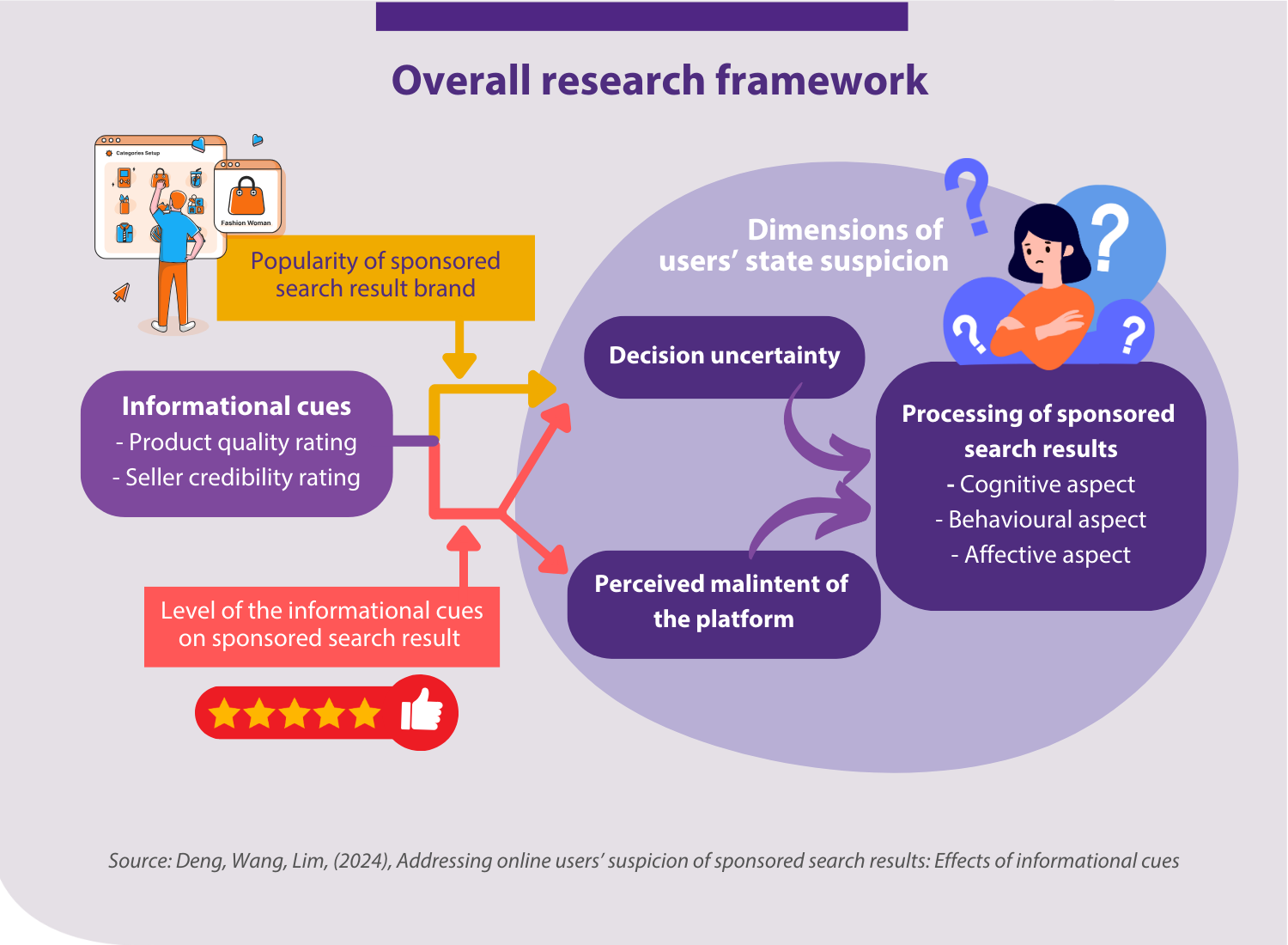Featured Faculty

Wang, Weiquan
Professor
Director, MSc Programme in Information and Technology Management
Co-Director, MSc Programme in Information Science and Technology Management
More in Consumer Behaviour, Innovation & Technology ...
Enhancing consumer trust in sponsored ads
• 6 mins read
Advertising on e-commerce is not an easy feat, especially when users grow sceptical. Leveraging ratings and reviews may help, to some extent
The global e-commerce market has expanded remarkably and is estimated to reach US$8.09 trillion by 2028, according to Canadian multinational e-commerce company Shopify. In this field, China has been dominating the market with platforms like Taobao, JD.com, and Pinduoduo providing a diverse array of products, making buying experience as effortless as a snap of the fingers. The hardest part may lie in searching for products that match expectations.
When looking for products on e-commerce platforms, users are normally presented with organic search results along with sponsored ones. These sponsored results are paid placements that advertisers purchase to promote their products. However, the growing number of misleading and deceptive advertisements have tainted user trust. As a result, users are likely to skip or even grow suspicious towards sponsored products or the sellers.

“Online users’ trust and evaluations in e-commerce are multi-facet concepts, such as whether the product is of high quality and whether the seller is honest,” says Wang Weiquan, Professor in the Department of Decisions, Operations and Technology at the Chinese University of Hong Kong (CUHK) Business School.
Advertisements are crucial for e-commerce to gain revenue and for sellers to boost sales, so user distrust could threaten the platform’s sustainability. In a study titled Addressing online users’ suspicion of sponsored search results: Effects of informational cues, Professor Wang, along with Deng Honglin of Tongji University and Lim Kai of the Hong Kong Polytechnic University, examined the complexities behind such scepticism and how to minimise it.
“Different positive informational cues, such as user ratings, seller reputation ratings, and product reviews, help users assess different facets of trust in the seller,” he adds. “These cues allow the user to compare the sponsored results or misleading advertisements with organic search results, thereby influencing their trust.”
Why do e-commerce users become suspicious?
E-commerce users are normally less sceptical when seeing organic search results. To understand how suspicions towards sponsored results arise, the researchers look into the nature, dimensions, and characteristics of such behaviour and identify three key reasons: decision uncertainty, perceived malintent and increased processing of sponsored search results.
Decision uncertainty appears when a user has difficulty in evaluating the search results accurately, e.g., whether the sponsored products are good quality or the sellers are credible. Perceived malintent refers to the perception that the platforms intend to mislead. Increased processing involves heightened cognitive, behavioural and affective efforts to evaluate the sponsored search results, which will reduce suspicions.
“Online users’ trust and evaluations in e-commerce are multi-facet concepts, such as whether the product is of high quality and whether the seller is honest.”
Professor Wang Weiquan
Through an experiment involving 90 participants using a website that simulated Taobao, the researchers found that positive informational cues can help ease suspicions. These cues can be related to the product quality via ratings and reviews from previous buyers, or the sellers’ credibility by showcasing information about the reputation, certifications, or other indicators that suggest reliability.
Showing positive informational cues will reduce decision uncertainty and perceived malintent, which also increases the processing of sponsored search results. The researchers argue that positive cues prompt internalisation, a mental process of adopting and integrating external information into one’s beliefs that leads users to change their perceptions.

“As user-generated content comes from other users who have purchased the products, it is generally perceived as more credible due to the altruistic motivations of prior buyers,” says Professor Wang. “By contrast, misleading advertisements create scepticism among users because these advertisements are sponsored by the seller, which acts in the seller’s interest and may conceal possible disadvantages of the seller.”
When positive cues are not enough
While giving out positive cues can influence perceptions, the researchers found that some users still bear suspicions towards sponsored search results. These users are typically wary of persuasive messages, making it harder to internalise positive cues. To investigate this further, in another experiment with 120 different participants on the same platform, the researchers delved into the conditions under which kind of cues are helpful to minimise suspicions.
The researchers found that showing popular brands on the sponsored search results will reduce users’ uncertainty and perceived malintent while increasing the processing of search results. A popular brand signals that many consumers have purchased and used the products, which pictures product quality. On the contrary, when an unknown brand is displayed, positive ratings and reviews may lower users’ uncertainty and perceived malintent, but they are not strong enough to overcome the inherent suspicion.
As users can easily compare the ratings and reviews of the sponsored results with organic ones on the platforms, the researchers looked deeper into other factors that may help to trigger internalisation. Through the third experiment involving a new group of 120 participants on the same platform, the researchers found that seeing sponsored and organic search results with similar positive ratings or reviews would reduce users’ decision uncertainty and perceived malintent, even for unknown brands. With such comparisons, users are more willing to process information about sponsored results if they feel assured about the quality based on ratings or reviews despite initial doubts about the unknown brand.
Increasing user engagement with sponsored search results

As organic results are typically shown in descending order from top to low ratings, the researchers encourage platforms to examine the rating of the sponsored results, especially for unknown brands, before allowing them to be presented on top of the search results page.
The rating should also be verified to be comparable to the organic results. Encountering poorly rated sponsored results may lead to scepticism about the platform’s overall credibility and the quality of its offerings.
Furthermore, presenting sponsored results with low ratings in the top position would be perceived as misleading. The platform should not place the sponsored results together with the top organic ones, as this would undermine its reputation.
“Platforms can enhance the credibility of sponsored search results by collaborating with reputable third-party organisations to provide certification badges or endorsements,” Professor Wang adds. “These endorsements or certifications can include quality assurance, user satisfaction survey results, or compliance with industry standards, effectively reducing user scepticism. Our study shows that users trust information from a reputable or credible source.”
Another way to boost user confidence is to collaborate with social media influencers as opinion leaders. The interaction between influencers and their followers fosters a sense of community and engagement, which can further increase users’ interest in and perceptions of the sponsored product.
Lastly, although the study was conducted in China, Professor Wang is certain that the findings are applicable to different environments. “Cultural differences can indeed influence consumer decisions on e-commerce. However, the fundamental psychological factors driving user suspicion and trust in online environments are universal,” he explains.
“The need for credible information and the tendency to rely on social proof, like user-generated content, are common across different cultures. Furthermore, e-commerce users in different cultures are exposed to similar types of online information cues, making our findings relevant beyond the Chinese context.”






